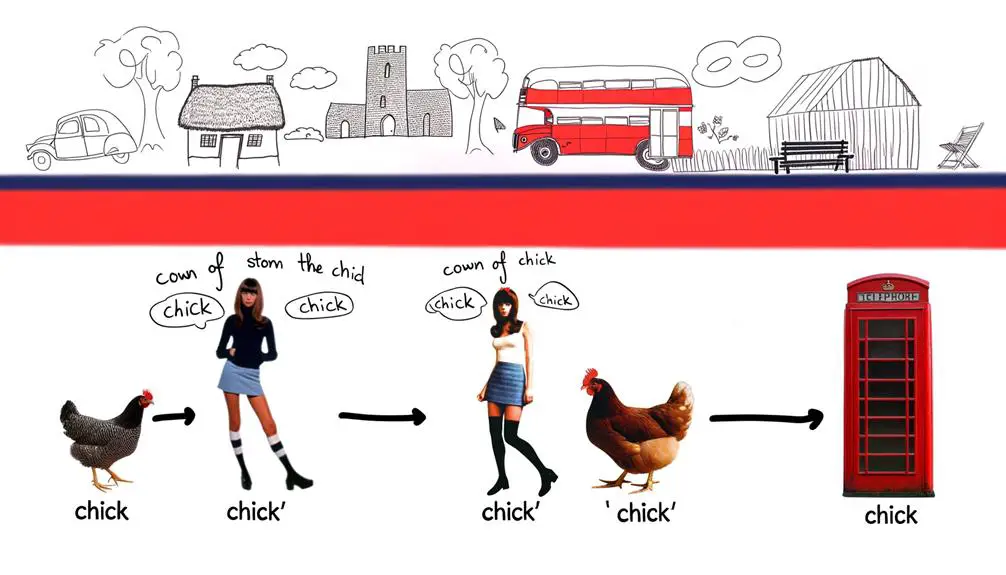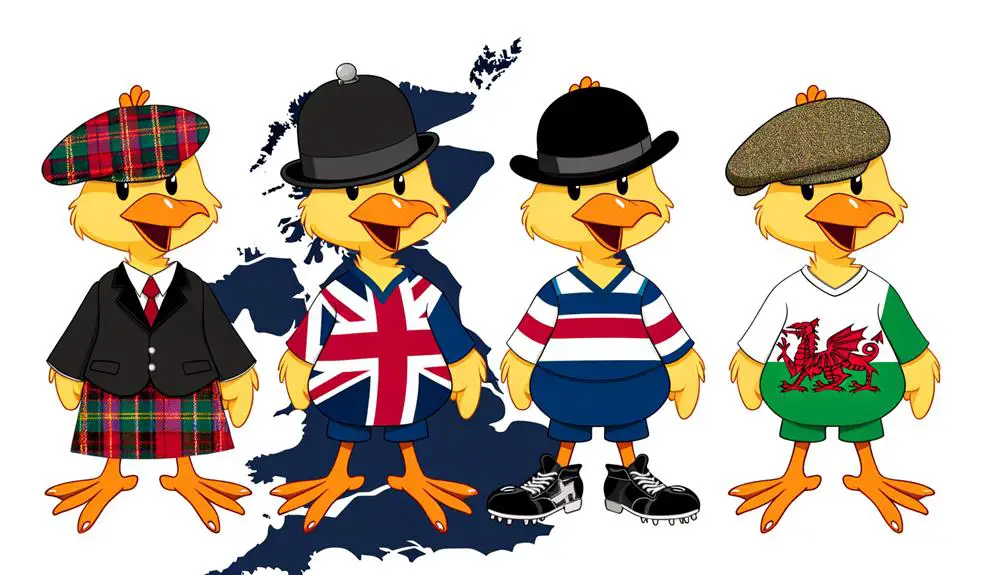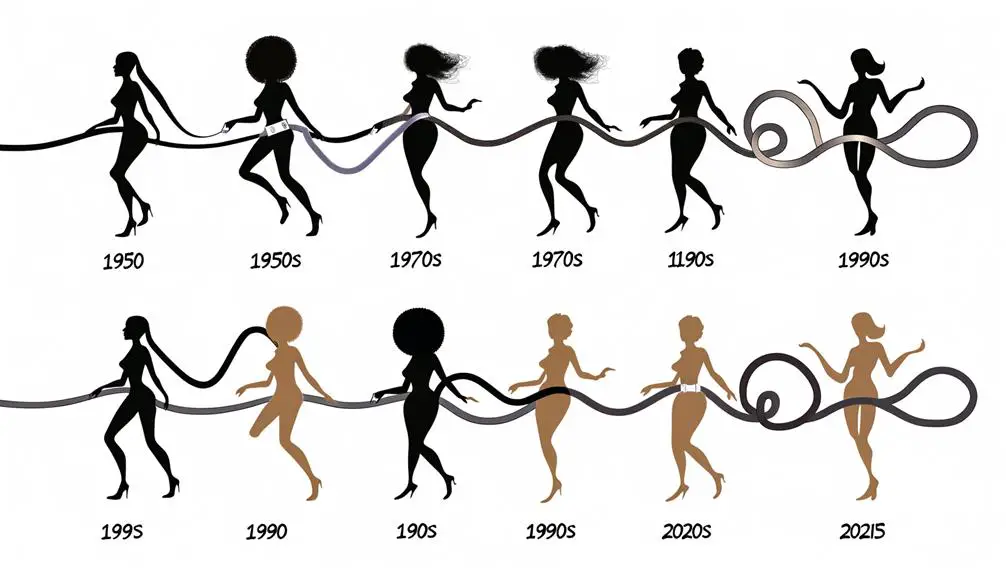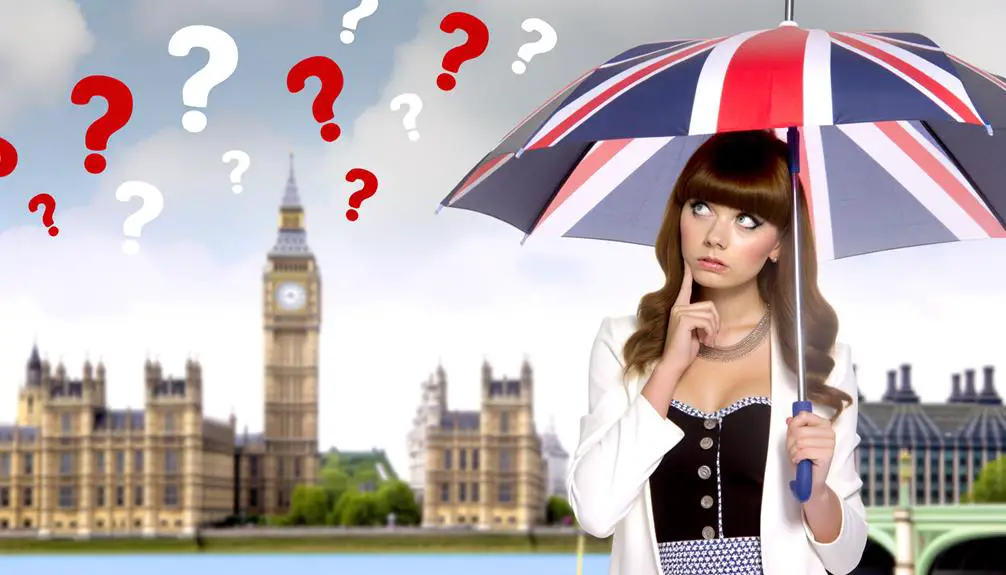In British slang, "chick" has evolved from its initial depiction of a young bird to a casual term primarily used for young women. Its journey from literal to metaphorical usage reflects broader societal shifts, highlighting the language's adaptive nature. Nowadays, "chick" can straddle the line between endearment and stereotype, depending on context and tone. It's a nuanced lexicon embodying diverse societal attitudes towards femininity and gender norms. This transformation showcases the term's potential for empowerment and reclamation, mirroring changing dynamics in gender perception. Unpacking the layers behind "chick" offers insights into the shifting landscapes of language and societal values.
Key Takeaways
- In British slang, 'chick' commonly refers to a young woman, often used casually or affectionately.
- The term has evolved from its original meaning as a young bird, reflecting linguistic and societal changes.
- 'Chick' can straddle the line between endearment and stereotype, depending on context and tone.
- It has undergone a transformation, sometimes being reclaimed as a term of empowerment by women.
- Regional variations exist, with the term carrying different connotations across the UK, influenced by local dialects and cultures.
Origins of 'Chick'

Delving into the origins of 'chick,' it's important to grasp how this term evolved from its early usage to become a widely recognized slang for a young woman. The transformation is deeply rooted in bird terminology, particularly the word's initial meaning as a young bird, typically a chicken. This linguistic journey from a literal description of poultry to a metaphorical representation of youth and femininity is fascinating, illuminating the fluid nature of language and its ability to adapt to changing social contexts.
The etymology debate surrounding 'chick' is as complex as it is intriguing. Some linguists argue that the term's evolution reflects broader societal shifts, especially in attitudes towards women and youth culture. Others, however, caution against overinterpreting this shift, suggesting instead that the slang usage of 'chick' emerged more from casual linguistic innovation than from any deep-seated cultural transformation. This debate underscores the challenges inherent in tracing the lineage of slang terms, which often emerge spontaneously and spread through oral traditions, leaving scant written records of their early use.
In analyzing the origins of 'chick,' you're engaging with a microcosm of linguistic development, where bird terminology intersects with societal changes, sparking a rich etymology debate. This exploration not only enhances your understanding of a single slang term but also offers insights into the dynamic processes that shape language over time.
Contemporary Meanings
Today's understanding of 'chick' reveals a nuanced lexicon where it's no longer just a casual term for a young woman but also a reflection of contemporary societal attitudes and identities. This change underscores a broader trend in language evolution, where animal references, once used in a straightforward, often diminutive manner, now carry complex connotations that demand linguistic precision from speakers and listeners alike.
In current British slang, 'chick' straddles the line between endearment and stereotype, its meaning heavily reliant on context. The term, while retaining some of its traditional charm, has morphed to accommodate a spectrum of identities far beyond its initial categorization. This shift speaks to the fluidity of language, demonstrating how terms that once carried a singular narrative can expand to illustrate the diverse experiences of those it describes.
Moreover, the usage of 'chick' today invites analysis of linguistic trends, revealing how societal shifts influence the lexicon. It's a proof of the adaptability of language, reflecting changing dynamics in gender perception without delving into the specificities of gender implications. Here, the focus on animal references and linguistic precision highlights the importance of context and the evolving nature of communication in capturing contemporary nuances.
Gender Implications

You'll find that the term "chick" is deeply entwined with societal gender norms, reflecting evolving perceptions of femininity over time. Its usage highlights how slangs morph, mirroring shifts in societal attitudes towards gender. Consequently, understanding its implications requires examining its role in both reinforcing and challenging traditional views on femininity.
Societal Gender Norms
Exploring the term 'chick' within British slang reveals complex layers of societal gender norms, highlighting how language both reflects and shapes our perceptions of gender roles. It's interesting to observe how masculinity debates and fashion influence intersect with the use of 'chick', revealing underlying societal expectations and stereotypes.
| Aspect | Influence on Perception |
|---|---|
| Masculinity Debates | Challenges traditional views, promoting a more nuanced understanding of gender roles. |
| Fashion Influence | Shapes the imagery associated with 'chick', linking appearance to gendered expectations. |
| Media Portrayals | Amplifies certain stereotypes, reinforcing traditional gender norms. |
| Social Interactions | Reflects and perpetuates gendered language, affecting daily communication. |
Through this lens, 'chick' becomes a focal point for examining how societal norms and gender expectations intertwine, influencing both individual identity and collective cultural attitudes.
Slangs Evolution Over Time
Slang's evolution over time reflects shifting gender norms, offering a lens through which we can investigate the nuanced ways language adapts to societal changes. This transformation isn't isolated; it's propelled by language globalization, allowing slang from various cultures to permeate and influence each other. As you explore the digital slang evolution, you'll notice how online platforms accelerate these changes, fostering a space where traditional gender connotations can be both challenged and reinforced. This digital landscape acts as a crucible for linguistic experimentation, where terms evolve faster than ever before. Through this lens, the term 'chick' in British slang, alongside others, showcases the dynamic interplay between language, gender, and cultural shifts, underscoring the perpetual motion of language evolution in reflecting and shaping societal attitudes toward gender.
Perceptions of Femininity
Understanding the term 'chick' within British slang requires an examination of how perceptions of femininity and gender implications have shifted in society. The evolution of female empowerment has greatly influenced the connotation of 'chick', transforming it from a potentially objectifying term to one that can be embraced with a sense of autonomy and strength. This shift is intertwined with changing beauty standards, where the emphasis on physical appearance as the sole determinant of a woman's worth is increasingly challenged. Analyzing 'chick' in this scenario reveals a nuanced understanding of femininity, reflecting broader societal movements towards equality and respect. It's a reflection of how language evolves with our changing understanding of gender roles and the empowerment of women in contemporary society.
Regional Variations

Delving into regional variations, you'll find that the term 'chick' carries nuanced meanings across different parts of the UK, reflecting local cultures and dialects. At the heart of these variations are dialect preferences and pronunciation differences, which shape the perception and usage of 'chick' in intriguing ways.
Analyzing these differences, you're drawn into the rich tapestry of British linguistic diversity. For example, in some regions, 'chick' might be affectionately used among friends, while in others, it carries a more flirtatious or even derogatory connotation. The pronunciation can vary greatly too, with some accents stretching the vowel, giving the word a completely different resonance.
To evoke the emotional landscape of these regional variations, consider the following table:
| Region | Emotional Connotation |
|---|---|
| North | Warmth and camaraderie |
| South | Casual, sometimes impersonal |
| Midlands | Playful, often affectionate |
This table highlights not just linguistic differences but the emotional undertones that 'chick' can convey, depending on where you are in the UK. It's a proof to the complexity of language and how it can both reflect and shape the culture of a place.
'Chick' in Pop Culture
In the domain of pop culture, 'chick' has woven itself into various media, subtly reflecting societal attitudes towards gender and familiarity. You've likely encountered the term in countless music references, where it oscillates between affection and derogation. Songs across genres utilize 'chick' to convey an array of emotions, from endearment to frustration, encapsulating the complexity of relationships and societal expectations. This duality is not only confined to lyrical content but also resonates in the listener's perception, highlighting the nuanced role of language in music.
Film portrayals further complicate the term's usage, often embedding 'chick' within dialogues that either challenge or reinforce gender stereotypes. You've seen characters refer to women as 'chicks' in scenarios that range from casual conversations to pivotal moments, revealing the filmmakers' intent and the characters' attitudes. These portrayals offer a mirror to society's evolving yet conflicting views on gender roles and interpersonal dynamics. Through analyzing 'chick' in pop culture, you're delving into a rich tapestry of linguistic expression that both shapes and reflects societal norms, inviting a deeper understanding of how language and culture intertwine.
Shifting Connotations Over Time

As you explore the evolution of "chick" within British slang, you'll find its early usage markedly different from today's interpretations, reflecting broader social shifts. This term's journey from its origins to modern contexts offers a window into changing perceptions of gender and identity. Analyzing its cultural impact provides insight into the language's adaptive nature and the societal values it mirrors.
Early Usage Evolution
Although the term 'chick' initially emerged within English vernacular as a casual reference to a young woman, its connotations have substantially shifted over time, reflecting broader societal attitudes and linguistic evolution. This transformation is not just a simple matter of changing attitudes but a rich tapestry of language comparison and dialect specifics that underline the fluidity of language.
| Era | Connotation |
|---|---|
| Early Usage | Informal, neutral |
| Mid-20th C. | Endearing, sometimes diminutive |
| Late-20th C. | Empowerment, reclamation |
Analyzing this evolution provides insight into how English, particularly British slang, adapts and reacts to societal changes. The journey of 'chick' from a casual descriptor to a term with varying degrees of affection and empowerment showcases the nuanced way in which language reflects and influences the cultural landscape.
Modern Interpretations
Today's interpretations of 'chick' reveal a linguistic landscape where the term's connotations continue to shift, reflecting evolving societal norms and gender perceptions. This movement illustrates the dynamic nature of language evolution and slang adaptation, impacting how this word is perceived and used.
- Empowerment vs. Objectification: While some see 'chick' as a casual, even affectionate term for women, others argue it carries undertones of objectification, highlighting the fine line between colloquial ease and potential disrespect.
- Generational Divides: Younger demographics tend to embrace 'chick' with less baggage, suggesting a shift towards more neutral or even positive connotations.
- Cultural Context: The term's interpretation can vary significantly across different cultural and social contexts, underscoring the importance of understanding the nuances of slang within specific communities.
Cultural Impact Analysis
Understanding the shifting connotations of 'chick' over time offers insight into its cultural impact and reflects broader linguistic trends. Initially, 'chick' might've evoked images of youthful, carefree women, closely tied to fashion influences of the era. As you explore further, you'll find that its usage and implications have evolved, mirroring changes in societal attitudes towards gender and identity. The term's adaptability showcases linguistic diversity's role in shaping slang, with 'chick' straddling lines between affectionate nickname and outdated stereotype. Fashion influences, reflecting changing norms and empowerment, have further nuanced 'chick's' meaning, transforming it within various contexts. This evolution underscores the dynamic nature of language, where words capture the zeitgeist, morphing in resonance with the times.







